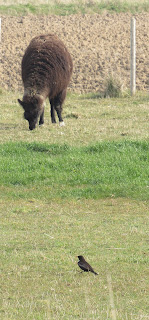CREDIT to birder Ben Macdonald for his direct approach to marketing his first book, Rebirding, which is published this month. He has pinged an email to county bird recorders throughout the UK. It consists of a press release and pre-publication reviews preceded by a supporting letter. Good luck to Ben with the book - and here's hoping Dalmatian pelicans are soon nesting in Somerset!
 |
| Ben Macdonald - keen for a bird 'turnaround' |
THE LETTER
Each year, in many cases, fewer and fewer of the birds in your recording areas are reported to you - whether willow tits in Gloucestershire, turtle doves in Hampshire, cuckoos in most of southern England or many moorland species on the ever more intensively managed moors of northern England. It must, at times, be infuriating to watch wildlife vanish before your eyes. So I decided to write a book aimed instead at envisaging how this could still yet be turned around.
Rebirding covers almost every part of the UK in terms of what is going wrong for our wildlife, focusing both on issues (invertebrate food loss, the loss of connectivity and the loss of the right animals in the right places to create optimal habitat) and on places (the sheep deserts of upland Wales, our grouse and deer estates, our dairy lowlands and our forestry plantations). Of all the people interested, I thought that those who assiduously document and record our changing birdlife would particularly like to read it.
I hope you’ll excuse the unsolicited email but Rebirding has genuine ideas that some of you may like to promote, whether Brownfield Biospheres for willow tits in the post-industrial north east, listed buildings for birds in London, large-scale wetland reserves from Dalmatian Pelicans in Somerset or increasing the planting of willows and birches to create cuckoo food-supplies in Devon. This is a book that can be read by anyone wanting to increase the sparrow population in their garden or who, like me, finds it embarrassing that Wales does not already have both eagle species flying over its mountains and coasts. I honestly think you will enjoy reading this book.
Best wishes,
Ben Macdonald
—
THE PRESS RELEASE
REBIRDING: Rewilding
Britain & its Birds
It’s very clear that
increasingly, we are all worrying about our vanishing wildlife, from the
hedgehogs and honey-bees we no longer see in our gardens, to the vanishing
cuckoos or turtle doves that any keen birder now needs to travel
farther than ever before to enjoy. Even half of our humble garden
sparrows have vanished since 1970 - at the staggering rate of 50 sparrows every
hour.
Rebirding looks at how wildlife decline in Britain could be turned
around. 94 per cent of Britain isn’t built upon. Snowdonia is larger and
emptier than the Maasai Mara. Scotland’s deer estates along cover an area
twice the size of Yellowstone. Britain has all the empty space it needs
for an epic wildlife recovery. So what’s stopping it from happening in
our country – and how can we turn things around?
For anyone who feels that reversing
world wildlife decline might frankly be a step beyond them, but who, like me,
shares a love of British wildlife and would love to see more of it, Rebirding
might be a book that interests you, whether you want to get more birds and
wildlife back in your garden (and what you can plant) or see Dalmatian pelicans returned
to Somerset’s ever-growing marshlands.
Why aren’t you expecting to see
Moose on a trip to the Peak District, or take your family on lynx safaris in
Wales? This is an entirely possible future - and it’s time to ask for and
expect more from our wildlife. If you want to know what that future looks
like, Rebirding has a few of the answers for solving Britain’s ever
worsening wildlife situation: rewilding our empty rural areas and bringing in a
new sector of ecotourism to fill the gap in our employment market.
Rebirding is available now on Amazon.
Ben Macdonald
THE PRE-PUBLICATION REVIEWS
“This is a wonderful book, visionary, illuminating and fascinating.
It will help accelerate the rewilding revolution now beginning in Britain.”
– George Monbiot
“Rebirding is beautifully written, based
on deep, personal experience and a genuine love of the subject. You may not
have come across Ben Macdonald before now; but believe me, you will hear a lot
more from him in the future.”
– Stephen Moss
“Having read a number of
the recent books about rewilding, I was tempted to think 'Oh blimey, not
another one!'. I am now tempted to say 'they left the best till last…”
– Bill
Oddie
“A must read and a good read…the type of book that grabs and keeps
my attention. You should read it and I think you may well enjoy it a lot”
– Mark Avery
“A book about a key subject at a key time, passionate and deeply
thought-through. Anyone concerned with the future of the natural world in
Britain will want to read it.”
– Mike McCarthy (former Independent wildlife
columnist; author of ‘The Moth Snowstorm’)
“Beautifully written,
thoughtful and provocative”
– Martin Harper (Conservation Director, RSPB)
“This is a
stimulating and important book, beautifully written and well researched… It
provides a compelling vision for the future”
– Carl G. Jones (Chief Scientist, Durrell Wildlife
Conservation Trust)




















